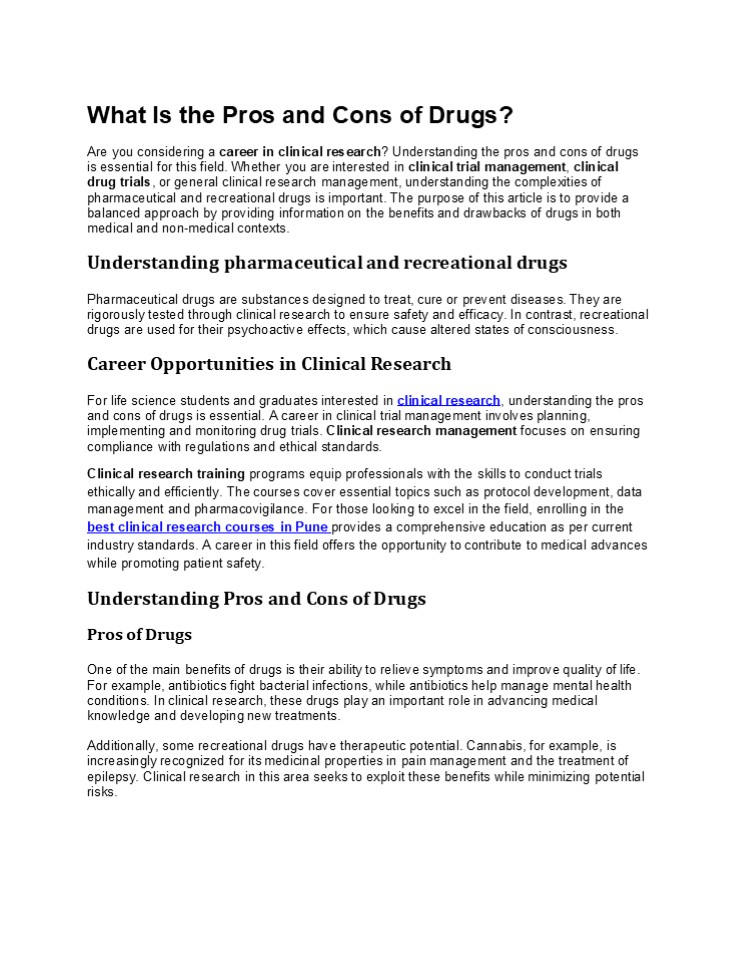What Is the Pros and Cons of Drugs? (1) - PowerPoint PPT Presentation
Title:
What Is the Pros and Cons of Drugs? (1)
Description:
Are you considering a career in clinical research? Understanding the pros and cons of drugs is essential for this field. Whether you are interested in clinical trial management, clinical drug trials, or general clinical research management, understanding the complexities of pharmaceutical and recreational drugs is important. The purpose of this article is to provide a balanced approach by providing information on the benefits and drawbacks of drugs in both medical and non-medical contexts. – PowerPoint PPT presentation
Number of Views:0
Date added: 9 October 2024
Slides: 3
Provided by:
PGEETIKA
Category:
Medicine, Science & Technology
Tags:
Title: What Is the Pros and Cons of Drugs? (1)
1
What Is the Pros and Cons of Drugs? Are you
considering a career in clinical research?
Understanding the pros and cons of drugs is
essential for this field. Whether you are
interested in clinical trial management, clinical
drug trials, or general clinical research
management, understanding the complexities of
pharmaceutical and recreational drugs is
important. The purpose of this article is to
provide a balanced approach by providing
information on the benefits and drawbacks of
drugs in both medical and non-medical
contexts. Understanding pharmaceutical and
recreational drugs Pharmaceutical drugs are
substances designed to treat, cure or prevent
diseases. They are rigorously tested through
clinical research to ensure safety and efficacy.
In contrast, recreational drugs are used for
their psychoactive effects, which cause altered
states of consciousness. Career Opportunities in
Clinical Research For life science students and
graduates interested in clinical research,
understanding the pros and cons of drugs is
essential. A career in clinical trial management
involves planning, implementing and monitoring
drug trials. Clinical research management focuses
on ensuring compliance with regulations and
ethical standards. Clinical research training
programs equip professionals with the skills to
conduct trials ethically and efficiently. The
courses cover essential topics such as protocol
development, data management and
pharmacovigilance. For those looking to excel in
the field, enrolling in the best clinical
research courses in Pune provides a comprehensive
education as per current industry standards. A
career in this field offers the opportunity to
contribute to medical advances while promoting
patient safety. Understanding Pros and Cons of
Drugs Pros of Drugs One of the main benefits of
drugs is their ability to relieve symptoms and
improve quality of life. For example,
antibiotics fight bacterial infections, while
antibiotics help manage mental health
conditions. In clinical research, these drugs
play an important role in advancing medical
knowledge and developing new treatments. Addition
ally, some recreational drugs have therapeutic
potential. Cannabis, for example, is
increasingly recognized for its medicinal
properties in pain management and the treatment
of epilepsy. Clinical research in this area
seeks to exploit these benefits while minimizing
potential risks.
2
Cons and Risks Despite their benefits,
medications also pose significant risks.
Pharmaceutical drugs can cause adverse
reactions, ranging from mild allergies to serious
side effects. In clinical research, careful
monitoring and strict protocols are required to
identify and manage these risks before the drug
is on the market. Recreational drugs pose even
greater risks due to their potential for
addiction and abuse. Substances such as cocaine
and heroin have high addictive potential, leading
to physical and psychological dependence. These
risks underscore the importance of regulatory
oversight and public health education. Challenge
s and Ethical Considerations Navigating the
complexities of drug research involves ethical
dilemmas. Balancing potential benefits with
risks requires careful consideration of
participant welfare and informed consent.
Transparency in reporting trial outcomes is
crucial for maintaining scientific integrity and
public trust. Conclusion In conclusion, drugs
play an important role in society they provide
therapeutic benefits while carrying inherent
risks. Understanding these dynamics is critical
for anyone pursuing a career in clinical
research. Whether involved in managing clinical
trials, drug trials or research oversight,
professionals in these fields contribute to
improving healthcare outcomes by maintaining
ethical standards. By informing and advocating
for patient safety, individuals can make
significant contributions to the advancement of
medical science. For aspiring professionals,
training in clinical research provides the
necessary foundation to responsibly navigate
these complexities. A career in clinical research
provides not only intellectual stimulation but
also the opportunity to positively impact global
health outcomes.































